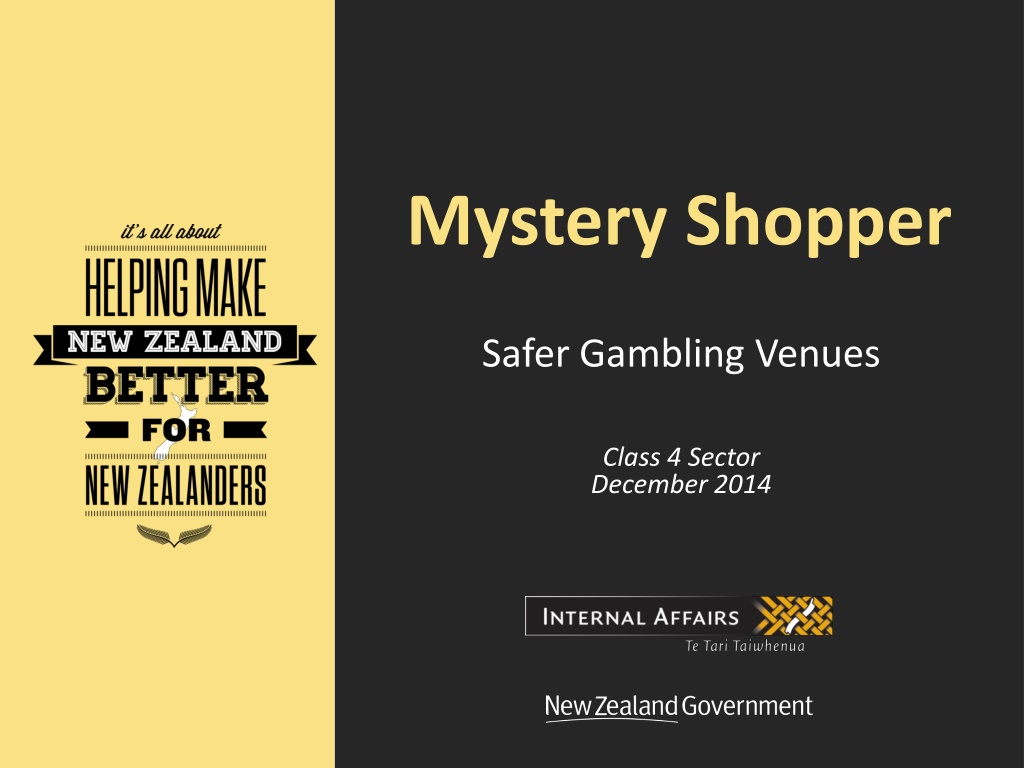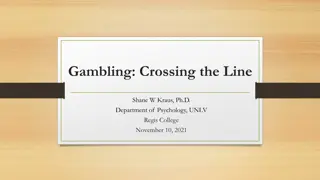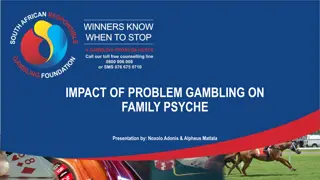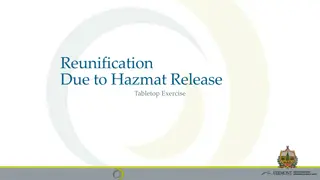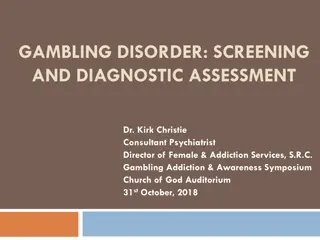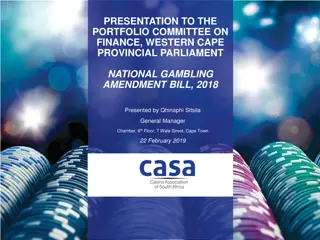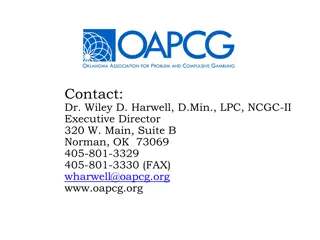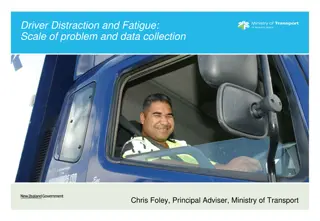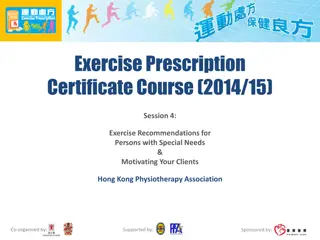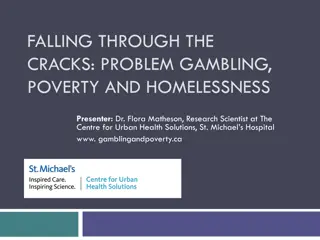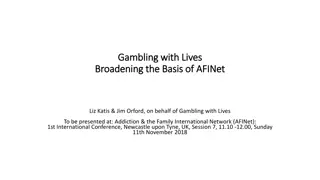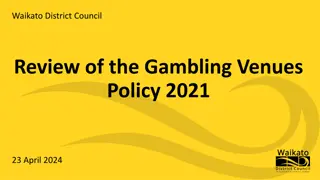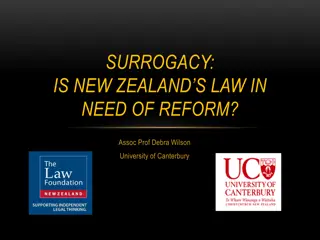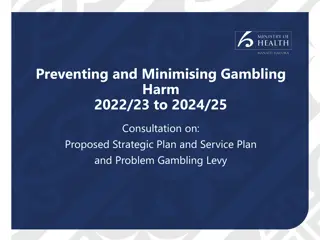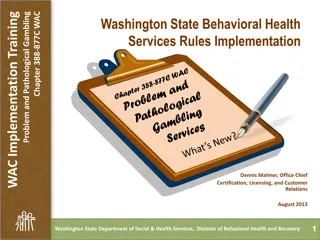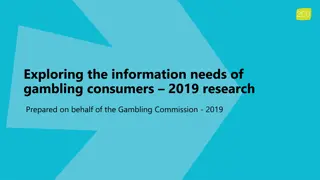Mystery Shopper Exercise for Safer Gambling Venues in New Zealand
Our regulatory activity aims to minimize harmful gambling behaviors and ensure a safe environment. Mystery shopper exercises were conducted to assess staff training effectiveness in identifying problem gamblers and promoting harm minimization practices in class 4 venues, including bars. The exercise covered a diverse range of venues across New Zealand, observing general problem gambling indicators and staff responses. Ethical considerations were prioritized to ensure independence and accuracy of results.
Download Presentation

Please find below an Image/Link to download the presentation.
The content on the website is provided AS IS for your information and personal use only. It may not be sold, licensed, or shared on other websites without obtaining consent from the author. Download presentation by click this link. If you encounter any issues during the download, it is possible that the publisher has removed the file from their server.
E N D
Presentation Transcript
Mystery Shopper Safer Gambling Venues Class 4 Sector December 2014
What we are trying to achieve Through our regulatory activity, we minimise harmful and criminal behaviours and contribute to a safe and prosperous nation. We can achieve this by promoting compliance that minimises harm and maximises benefit. We want to proactively minimise and prevent gambling harm.
Why a Mystery Shopper Exercise? What we knew What we didn t know The Gambling Act 2003 requires casino and class 4 operators to develop and implement policies for identifying problem gamblers. How proactive / effective are staff at putting their training into action? Is there a problem what is the extent of the problem? Staff can play an important role in minimising gambling harm host responsibility. We had no baseline information, and were unable to measure the impact of future initiatives. The mystery shopper results allow for retesting. There can be a number of barriers to approaching gamblers. Department of Internal Affairs
Our Approach / challenges This was a research exercise (as opposed to a compliance exercise). We carried out the exercise across the class 4 and casino sectors. We didn t mystery shop clubs but we are interested in their harm minimisation practices. We used an external provider to ensure independence. Ethical considerations were taken into account e.g. creating problem gamblers, winning jackpots etc. Department of Internal Affairs
The class 4 Exercise Class 4 Venues (bars) 102 venues = 10% of NZ venues. Mix of urban, rural, 18 machine vs. 9 machine etc. Shoppers gambled for two hours (generally during the day) and displayed general problem gambling indicators: sighing, head resting on hands, talking to machine, expressing frustration Observed sweeping of rooms and other patron behaviours. Role-play = cash withdrawal from a staff member: I need to go but I need to win some money back (used in 77% of scenarios) I can t really afford it but I think I m getting close to a win (16%) I m meant to get home to the kids but a few more minutes won t hurt (used 7%)
Regional Spread of venues
Other points of note We acknowledge that our shoppers were not repeat / known patrons it may be easier to approach patrons after observing multiple playing sessions. We tested specific areas of harm minimisation practice other areas (such as the exclusion process) were not tested. There may be entries on venue incident logs that show behaviours were at least noted these were not checked. The results rely on the interpretations of our shoppers. However, the shoppers: Went through a careful selection process ensuring experienced shoppers Were given comprehensive training Were given regular debrief sessions as the exercise progressed The high number of venues tested strengthens the robustness of the results.
Class 4 Key findings Possible interventions: # Asking if the person is OK 99% of scripted scenarios delivered by mystery shoppers did not result in an intervention from staff: However, comments recorded indicate many scripted scenarios caught the attention of staff (e.g. the staff member seemed embarrassed or said something else in response) # Questioning whether they should withdraw the money # Suggesting they take a break # Providing problem gambling information to the person 100 other patrons1 were observed displaying possible problem gambling indicators at 46 of the venues visited (45% of all venues): 95% of these patrons did not receive an intervention from staff # Suggesting they leave the venue # Asking them about their gambling 1 - Shoppers were unable to record the overall number of patrons
Class 4 Key Findings continued Recognised best practice for monitoring gambling areas is to conduct sweeps of the area every 15 minutes = six-eight sweeps for our scenarios: This is claimed as a cost in venue cost schedules 14 venues achieved the desired result of six-eight sweeps. Ten had no sweeps. Floor Sweeps Instances 1 Sweep 2 Sweeps 3 Sweeps 4 Sweeps 5 Sweeps 6 Sweeps 7 Sweeps 8+ Sweeps No Sweeps Grand Total % Sweep Count Comments indicate that many sweeps involved staff focussing on other activities (e.g. re-filling a hopper) 21 22 20 10 5 2 2 10 10 102 20.6% 21.6% 19.6% 9.8% 4.9% 2.0% 2.0% 9.8% 9.8% 100.0%
What does this indicate? There is not an increase in problem gambling, but harm minimisation practices need to be improved. The need to improve harm minimisation practices is a nationwide issue - not a problem faced by only one or two societies: May reflect the difficulty many societies have in operating with a distributed network Class 4 staff may not be adequately trained to carry out their harm minimisation obligations. Class 4 staff may be aware of what they should do, but choose not to put it into practice due to a number of barriers or conflicting priorities: We re not advocating spending additional money reviewing existing practices may be more effective
Next Steps Media release about the exercise and results issued after consultation with the sector. The Department considers education and support as the best way to improve the situation at this time. The Department may choose to undertake another mystery shopper exercise as it is an effective tool for determining actual practice. The Department may take enforcement action for future results.
Working with the sector class 4 The sector must own this issue. We encourage the sector to collaborate on harm minimisation initiatives. Continue our review of existing harm minimisation training practices: Look for opportunities to make improvements/efficiencies address the issues identified in the mystery shopper exercise. Develop a venue-based best practice harm minimisation policy. Continue to support the Health Promotion Agency in their development of resource material with venue based messages. The Department s expectation is that the sector will work on strategies for lifting overall staff performance - and the Department will work with the sector to achieve this outcome.
